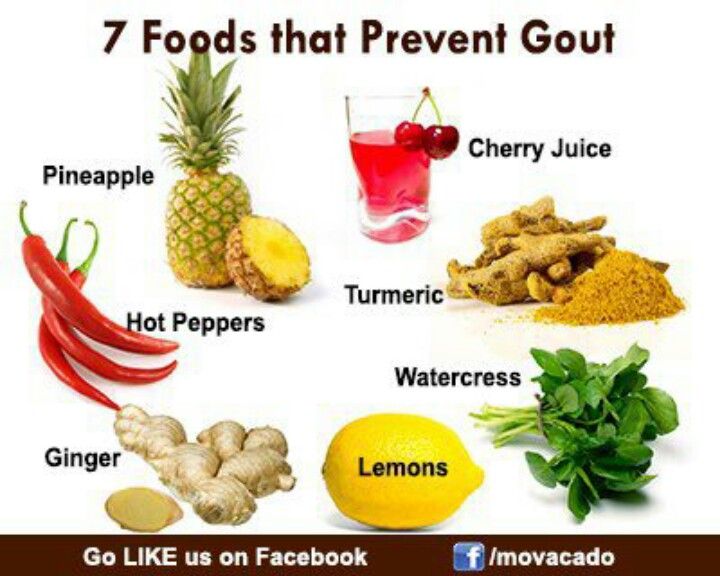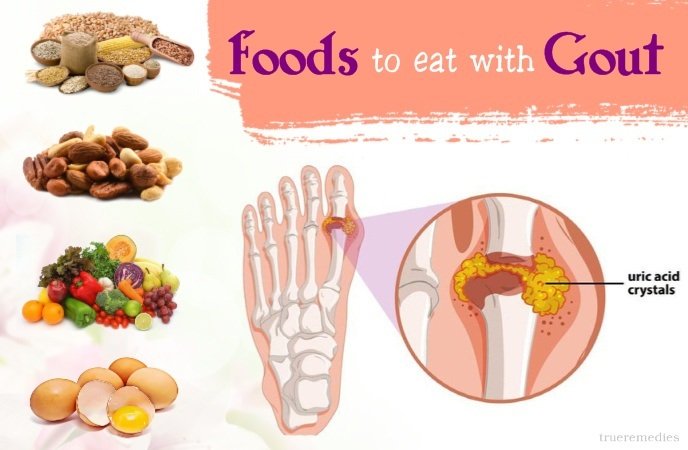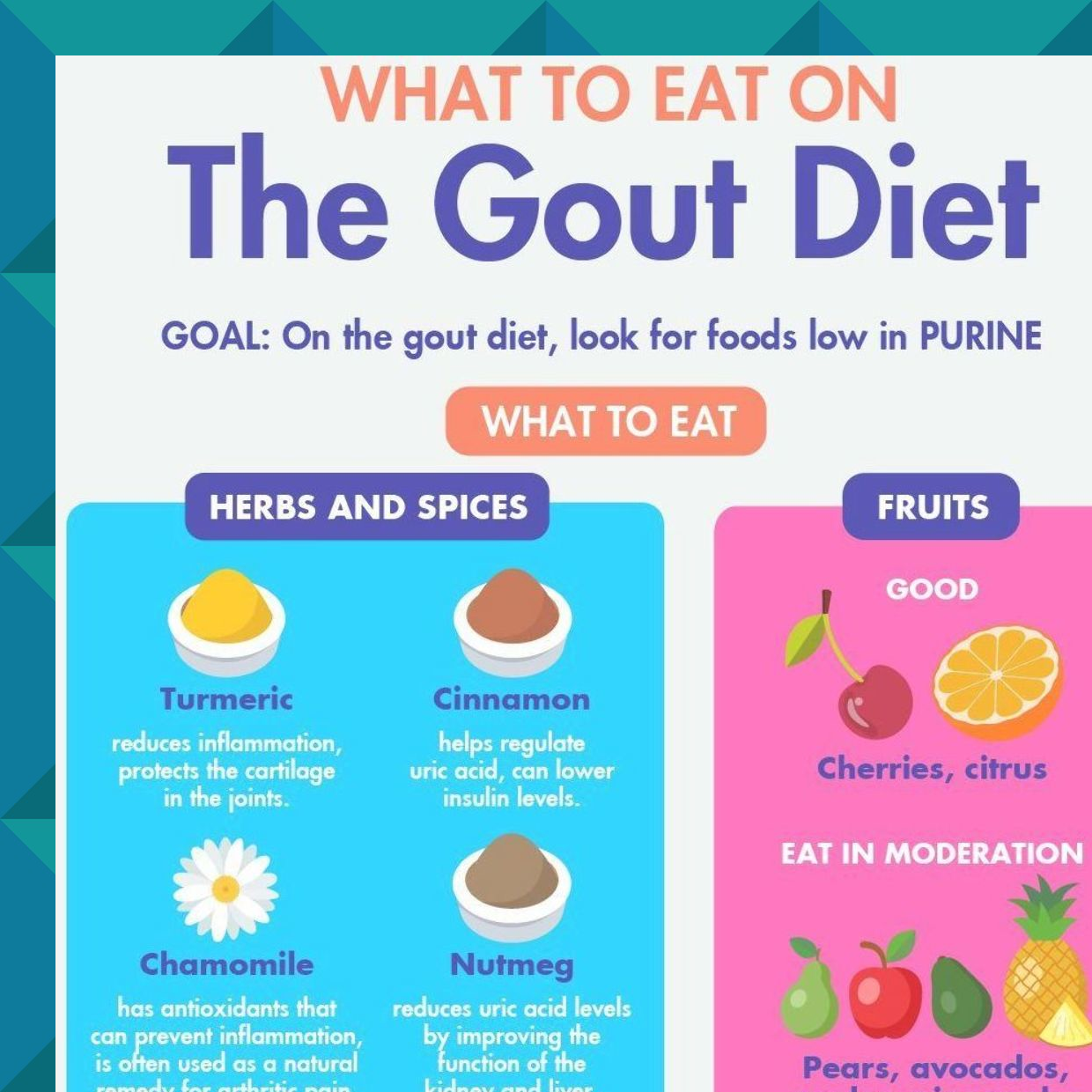Which Foods Should You Avoid When You Have Gout
Purines are compounds that are found in specific food and drink and they change to uric acid in the body. Most meat and seafood are high in purine and can increase uric acid levels in the body. These therefore should be limited during episodes of a gout attack and portion size should be reduced. Common examples of foods high in purine include anchovies, sardines, offal foods such as liver, kidney, sweetbreads, game, goose, minced meat, mussels, partridge, roe, scallops, herring, gravies, stock cubes and meat and yeast extracts.
Exercise And General Health
In addition to following the gout diet, your healthcare provider may recommend that you make other changes to help you live comfortably with gout. The recommendations may include physical activity.
Studies have shown that regular exercise can help to improve joint function and help you to maintain a healthy weight. However, strenuous exercise can do more harm than good and dehydration may raise the level of uric acid in serum and trigger gout.
Is High Fructose Corn Syrup A Problem
Yes, absolutely. High-fructose corn syrup is a known factor for gout flare-ups because it raises uric acid levels in your body. Its also used in far more pre-packaged and processed foods than you might think. When youre grocery shopping, always check nutrition labels. If corn syrup is an ingredient in a product, dont buy it.
Recommended Reading: Gout In Heel Pictures
What Effect Do Your Weight And Diet Have
Some studies suggest that certain foods are linked to gout attacks. Gout attacks are apparently more common in people who have eaten a lot of meat, fish or seafood a few days before. That matches many peoples experiences. On the other hand, purine-rich plant-based foods such as peas, beans, lentils, spinach, mushrooms, oats, cauliflower and broccoli were found to have little to no effect on the risk of a gout attack. Overall, there hasnt been much good quality research into the link between certain foods and gout attacks.
Eating cherries is sometimes recommended to prevent gout attacks, but theres no scientific proof that it can help prevent gout.
Because not everybody has the same metabolism, its a good idea to try out for yourself what helps you and what doesnt and how much of different foods your body tolerates. Some people feel better after changing their diet, while others successfully lower their uric acid levels with medication and cope just fine without any changes to their diet.
Individual studies also suggest that losing weight can help if youre very overweight. People with gout should be careful not to go without any food, though fasting can itself trigger a gout attack.
Fruits Moderate In Oxalate

The oxalate content of fruit may vary depending on its ripeness, the climate in which it is grown and the soil conditions. Fruits containing a moderate level of oxalate have between 10 to 25 milligrams of oxalate per serving. These fruits include mandarin oranges, mangoes, strawberries, oranges, prunes, fruit cocktail, lemons, blackberries and blueberries. New York University suggests eating calcium-rich foods that will bind the oxalate, which will then cause it to be passed in the stool.
You May Like: Is Rice Good For Gout
What Foods Should You Avoid
If youre susceptible to sudden gout attacks, avoid the main culprits high-purine foods.
These are foods that contain more than 200 mg of purines per 3.5 ounces .
You should also avoid high-fructose foods, as well as moderately-high-purine foods, which contain 150200 mg of purines per 3.5 ounces. These may trigger a gout attack.
Here are a few major high-purine foods, moderately-high-purine foods and high-fructose foods to avoid (
- meats: These include liver, kidneys, sweetbreads and brain
- meats: Examples include pheasant, veal and venison
- Fish: Herring, trout, mackerel, tuna, sardines, anchovies, haddock and more
- seafood: Scallops, crab, shrimp and roe
- Sugary beverages: Especially fruit juices and sugary sodas
- Added sugars: Honey, agave nectar and high-fructose corn syrup
- Yeasts: Nutritional yeast, brewers yeast and other yeast supplements
Additionally, refined carbs like white bread, cakes and cookies should be avoided. Although they are not high in purines or fructose, they are low in nutrients and may raise your uric acid levels (
Summary: If you have gout, you should avoid foods like organ meats, game meats, fish and seafood, sugary beverages, refined carbs, added sugars and yeast.
Gout And Diet: Foods And Drinks To Avoid
Gout is an arthritic condition that can cause sudden, severe joint pain. If you are experiencing symptoms of gout, the NHS recommends that you see a doctor for treatment during an attack and to help prevent further attacks.
We asked Emer Delaney, a dietitian who has worked in some of London’s top teaching hospitals, to explain how diet and lifestyle can affect the condition.
You May Like: Pistachios Nuts And Gout
Foods Contributing To Chronic Disease
Remember, the development of gout is also influenced by other chronic diseases including high blood pressure, diabetes, kidney disease, heart failure and obesity. Studies have shown that losing weight lowers the risk of the disease.
Therefore preventing and treating gout means preventing and treating these other chronic diseases as well as effective weight management. While there are certainly some exceptions, the development and treatment of these chronic diseases is also strongly rooted in diet.
Salt
High salt diets are strongly associated with hypertension and congestive heart failure. A diet low in salt is a well described treatment for people with these conditions and is literally prescribed for this purpose.
The DASH diet is the most popular of these to date, and people who follow the DASH diet have been shown to have lower rates of gout .
Saturated Fats
Saturated fats such as fried foods are generally unhealthy choices. They contribute a significant amount of cholesterol and calories while providing very little positive nutritional value. They are a large culprit in the obesity epidemic and the associated comorbid disease.
Processed Foods
Its recommended to use caution with processed foods because they so frequently contain either high levels of salt, sugar, saturated fat, empty calories or a combination of some or all of the above.
Which Other Lifestyle Factors Can Affect Gout
While there are no controlled studies or evidence on the effect of lifestyle changes on the incidence of gout, expert opinionis that positive changes in lifestyle can be beneficial to the management of gout. Being overweight is not recommended for gout suffers and the available evidence indicates that losing weight may helpful. Dietary modifications to achieve a healthy body weight are recommended, however the use of crash, high-protein and low-carbohydrate diets should be avoided. Slow and steady weight loss is ideal and support from a dietitian should be sought to help develop a sustainable and balanced weight loss plan. Rapid weight loss is not recommended as it can increase the amount of uric acid in the body leading to an increased chance of a gout attack.
Regular exercise such as swimming or walking is also recommended as it may help reduce the frequency of gout attacks. In addition, it may have a beneficial effect on associated co-morbidities such as type 2 diabetes, hypertension and insulin resistance.
Recommended Reading: Almond Milk Gout
Foods You Can Eat In Moderation
Aside from organ meats, game meats and certain fish, most meats can be consumed in moderation. You should limit yourself to 46 ounces of these a few times per week .
They contain a moderate amount of purines, which is considered to be 100200 mg per 100 grams. Thus, eating too much of them may trigger a gout attack.
- Meats: These include chicken, beef, pork and lamb.
- Other fish: Fresh or canned salmon generally contains lower levels of purines than most other fish.
Summary: Foods you should eat with gout include all fruits and vegetables, whole grains, low-fat dairy products, eggs and most beverages. Limit your consumption of non-organ meats and fish like salmon to servings of 46 ounces a few times weekly.
Processed Foods And Refined Carbs
The modern Western diet is often high in processed foods and refined carbohydrates. In addition, processed foods and refined carbohydrates have been linked to an increased risk of type 2 diabetes, heart disease, and weight gain.
A 2017 study looked at gout incidence in people who followed either a Western diet or the Dietary Approaches to Stop Hypertension diet. The researcher found the DASH diet was associated with a lower risk of gout, whereas the Western diet was associated with a higher risk of gout.
To help prevent gout symptoms, its best to limit highly processed foods and beverages and foods high in refined carbohydrates, such as sweets, baked goods and pastries, chips, crackers, cookies, candies, soda, ice cream, white breads, and some pre-made frozen meals.
Eating highly processed foods and refined carbohydrates in moderation will not only help with your gout, but your overall health as well.
Don’t Miss: Almond Milk And Gout
What To Eat To Treat And Prevent Gout
Avoiding certain foods high in purine and managing weight may help prevent the painful symptoms of gout and stop it from developing in the first place. Understanding how food affects gout and what to eat can help someone manage their symptoms.
Gout is a form of arthritis that can happen when too much uric acid in the body causes crystals to form in the joints, resulting in pain and inflammation.
Diet plays an important role in gout as certain foods can cause excess uric acid, or hyperuricemia.
Additionally, the Centers for Disease Control and Prevention advise that eating a healthy diet and avoiding becoming overweight can help someone manage their symptoms.
This article looks at how a person can eat to manage and prevent gout, including which foods to eat and which foods to avoid.
When planning a diet for gout, someone should aim to limit or avoid the following types of foods.
List Of Foods To Avoid With Gout And High Uric Acid

The first line of treatment of gout is removing the causes and correcting the diet. So, here we will discuss the foods to avoid gout.
Gout is a disease ofjoints that results in arthritis or inflammation in the joints. It causessevere pain, tenderness, and jointswelling. Generally, it affects the baseof the toe. Some experience hotness orburning sensation in joints.
The basic principle toavoid foods in gout or high uric acid is to stop eating salty, sour, spicy and friedfoodstuff in excess. These food itemsaggravate the gout attack. These may also become a great hindrance to prevent areduction in uric acid in the blood.
Recommended Reading: Gout And Tofu
Can I Drink Alcohol
Drinking alcohol can increase your risk of a gout attack as it can raise the level of uric acid in your blood. While it is possible to control gout attacks without completely cutting out alcohol, try to reduce the amount of alcohol you drink and avoid binge drinking . Talk to your doctor or read the Australian government guidelines on recommended alcohol intake.
Foods To Avoid With Gout
When a patient asks Bernadette Siaton MD, a rheumatologist at the University of Maryland Medical Center who treats gout, what foods they should avoid, she doesn’t recommend specific foods.
Instead, she encourages her patients to eat a low-fat, low-sugar, healthy and balanced diet.
“That type of diet is beneficial for most people, even in the absence of gout,” Dr. Siaton says.
Weight loss is recommended for people with gout who are overweight or obese, even if gout flares are rare or nonexistent, according to the 2020 American College of Rheumatology Guidelines for the Management of Gout.
Still, gout is a disease that results from excess uric acid burden in the body.
“Some foods have high purine content, and when the body breaks down purines, uric acid is the end result,” Dr. Siaton says. “I tell patients to stay away from foods high in purines.”
With that said, here are some foods and drinks you generally should avoid to keep gout at bay.
Don’t Miss: Side Effects Of Allopurinol And Alcohol
Are Some Types Of Alcohol Better Than Others
It seems that gout attacks are more common in beer and spirits drinkers than in people who drink wine. Many beers contain large amounts of purines, which can lead to elevated uric acid levels in the blood. However, there is no scientific proof that only certain types of alcoholic drinks can lead to gout attacks.
Best Diet For Gout: What To Eat What To Avoid
We include products we think are useful for our readers. If you buy through links on this page, we may earn a small commission. Heres our process.
Gout is a type of arthritis, an inflammatory condition of the joints. It affects an estimated 8.3 million people in the US alone (
Fortunately, gout can be controlled with medications, a gout-friendly diet and lifestyle changes.
This article reviews the best diet for gout and what foods to avoid, backed by research.
Don’t Miss: Is Onion Bad For Gout
How Do You Get Gout
How does uric acid acid get in your body?
Uric acid is a waste product produced when our body breaks down chemicals called purines. Purines are found in our tissues as well as in some types of food we eat.
It builds up when we are either making too much uric acid or when we arent able to get rid of it quickly enough.
Some common chronic diseases make this more likely and are risk factors for this type of inflammatory arthritis.
Risk factors that can be decreased with lifestyle changes :
These symptoms often come in waves with an acute attack lasting days to weeks at a time. Repeated attacks can lead to more chronic gouty arthritis, in which people feel pain that is ongoing although usually less severe than the classic flares.
Worst Foods To Avoid With Gout
The feeling of continuous pain caused by the symptoms of gout always haunts you. It is continuously running in your mind and has even started bothering your life. You are constantly telling your body to avoid sudden flare up caused by gout. But suddenly it happens and you end up in intense pain. There is nothing much you can do to cure your pain instantly. But fortunately, you can do a lot to avoid future gout pain from flaring up. The first thing to start with is to know the foods to avoid with gout.
Don’t Miss: Allopurinol And Alcohol Interaction
Some Meat Fish Eggs Beans And Pulses
Eat these foods in moderation. Having vitamin C with meals can help to improve the absorption of iron, so drink a small glass of orange juice, have a piece of fruit for dessert, or serve up meals with plenty of vegetables. Keep your portions of meat controlled by using your hands as a serving size guide. A serving is about the size and thickness of the palm of your hand.
Avoid Sweets And Sodas

Unlike fruit with its natural sugar, artificial sugars are widely recognized as gout flare dangers. Consuming too many sugary sodas has been found to provoke attacks, but no association has been found with artificially sweetened sodas. Other foods loaded with high-fructose corn syrup can also bring on gout pain.
You May Like: How Many Cherries Should I Eat For Gout
Vegetables Cooked In Animal Products
Similar to how you might think okra is good for gout simply because it is a vegetable, you might assume animal products are good for gout because they are sources of protein. However, there is a reason why many animal products fall into the list of foods to avoid with gout: they are high in purines and animal fat. While some animal products are allowed such as low-fat dairy products, poultry and some seafood many high-fat animal products are to be avoided on a diet to reduce gout.
Vegetables cooked in animal products may have higher purine content, which can lead to more uric acid in the body. According to Cleveland Clinic, high uric acid levels can also be attributed to genetics. If the increased risk of gout is hereditary, they still recommend adopting a healthy diet.
Avoid cooking vegetables in the following animal products:
- High-fat butter
- Gravy
- Fish sauce
For example, mashed potatoes and gravy are a popular combination. While potatoes themselves are compliant on a gout-reducing diet, potatoes doused in gravy are not. Many people also consume vegetables cooked in butter or grease, which are both discouraged. If you have gout, season your vegetables with herbs, spices and other low-fat sources of flavor.
According to Mayo Clinic, high-fat animal products are limited because of their saturated fat content. While fats are important for overall health, people with gout should stick to sources of healthy dietary fats and avoid consuming too much saturated fat.
Do I Need To Stop Drinking Alcohol With Gout
Yes, its a good idea to cut out alcohol. Alcohol molecules in your body tend to increase uric acid levels, so drinking can push you over the edge and into a flare-up. If youre newly diagnosed and start taking medication, try cutting out alcohol at first. Your doctor may allow you to add a small amount back into your diet over time as your uric acid levels come down. But even then, its best to avoid beer and liquor and stick to safer choices such as red wine, Dr. Burg says.
All myths aside, the best advice for people with gout is to eat fresh, unprocessed foods. Choose complex carbohydrates over refined carbs from packaged or processed foods. And always drink plenty of water because dehydration is a risk factor for an acute attack.
Don’t Miss: Almond And Gout